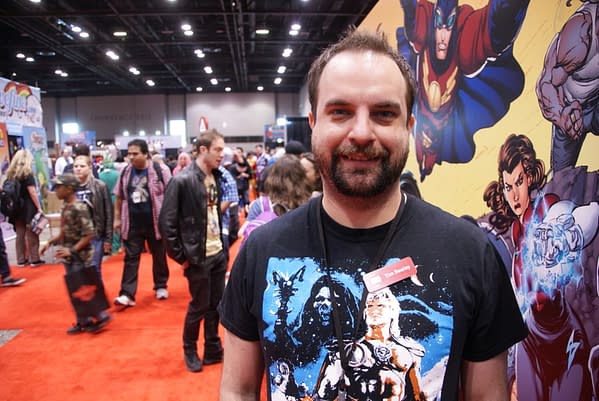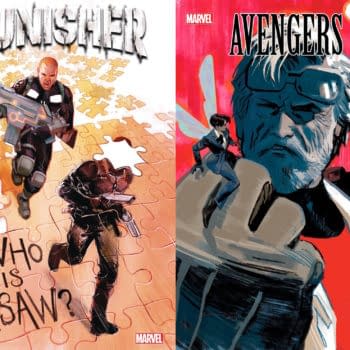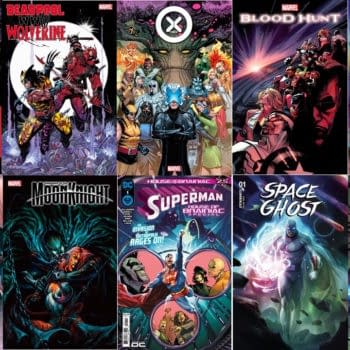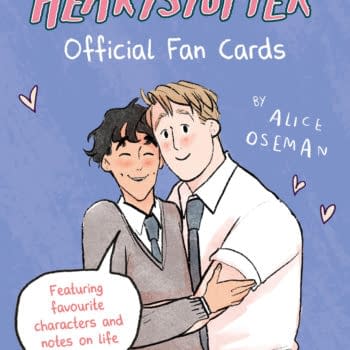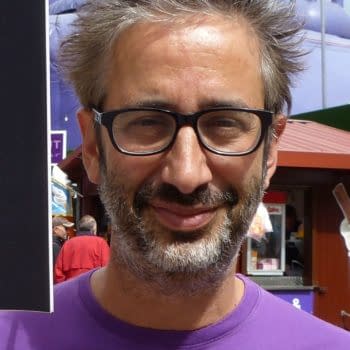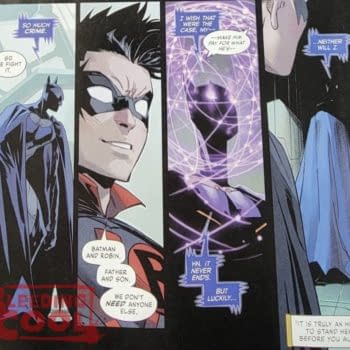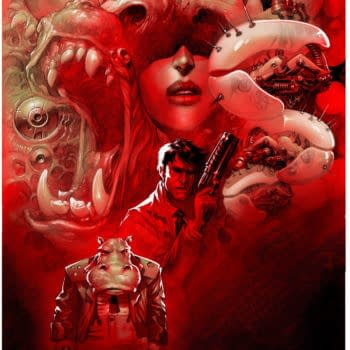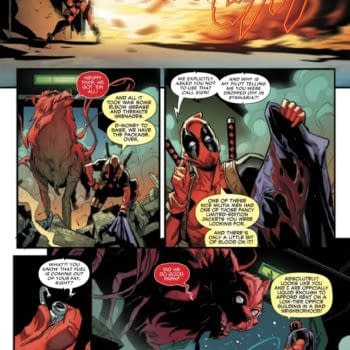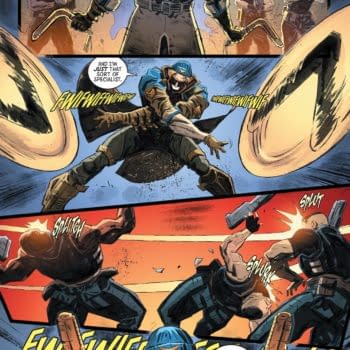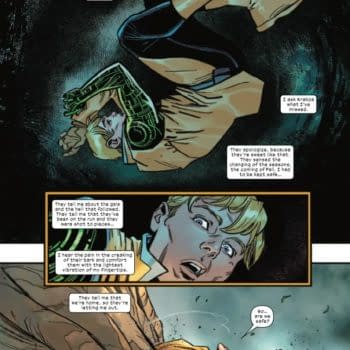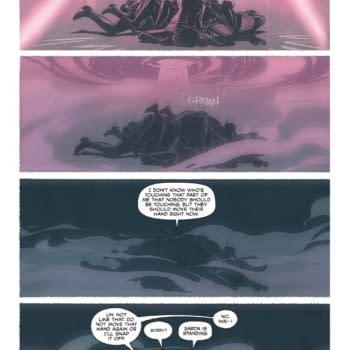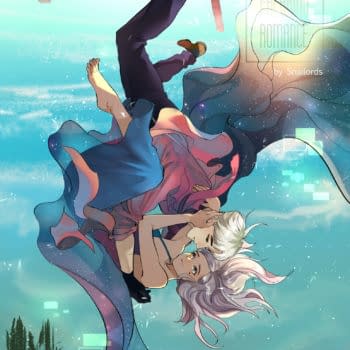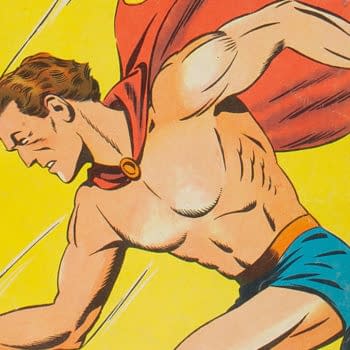Posted in: Comics | Tagged: Comics, image, revival, tim seeley
Tim Seeley – A Renaissance Man
Tim Seeley, the writer on books such as Revival and the artist on books like Ex Sanguine, is the rare combination of multi-talent in the comic book industry. Seeley writes book for publisher such as Image and Dark Horse Comics, jumping between the role or writer and artist on projects and sometimes blending the roles together.
I had a chance to sit down and chat with Seeley at C2E2 (Chicago Comic and Entertainment Expo) this year just behind the Dark Horse booth in the isles. Seeley is calm, collected, and polite. When I saw him at his table in Artist Alley, I never saw him deny someone a signature, whether they had purchased something or not, or even if he was in the middle of a sketch or commission.
You work as an artist and a writer. Is there one you feel is your true passion? As you have both perspectives, who do you think has the harder job?
A: I always say I'm a writer who draws. I just feel that's what I am. Passion wise, it depends. I just love making comics so for me both processes are about making comics. Most of time I think it's less time consuming to be a writer. Drawing is really intensive. You can write a page in two minutes. Minimum is going to take you four or five hours to draw it, if not sixteen hours. Now that I do writing full time drawing can get frustrating but it's never as frustrating as writing. If you can't get a drawing you just erase it and do the next panel. In writing, if you can't get something, you can't move on. You're basically stuck. If you have a hang up you're just sitting there cursing. The frustration levels are different but I think the artist is the work force when it comes down to it.
How did you get started in comic books?
I grew up in central Wisconsin. I was always a huge comic fan. I was always making my own comics as a kid. In fact, my report on career day when I was 11 was about how I wanted to be a comic book artist. I wrote to Marvel and they sent me all the information about royalties and stuff. I knew stuff about comics no 11-year-old kid new.
I always wanted to do it and when I got into college I started the illustration program and was always working on comic son the side. I was going to cons ever summer when I wasn't in school and I just met the right people and when I was living in Minneapolis as a children's book illustrator, I worked at a children's book company during the day, I would do comics at night. Then a friend of mine, Josh Blaylock, call me up and said 'hey, I'm going to do G.I. Joe. They gave me the licence. I can't believe it. Do you want to come down and work for me?' and I was like 'absolutely.' I started out editing and doing design and whatever and then I eventually fell into drawing G.I. Joe because the artists that were doing couldn't keep up on the schedule and I'm fast. Then I was drawing all the time and I started pitching ideas because I wanted to write something so I pitched Hack Slash and then I ended up being a writer too.
Ex Sanguine trade is coming out soon. You are credit as a writer, along with Joshua Scott Emmons, and the artist on the series. How is it working on a book you are helping create the story for along with create the art for?
It was actually really interesting; partially because Josh did all the really hard work basically. The process on Ex Sanguine was sit around talk about it, jam on ideas, Josh has to write the script. As far as actually writing on that one it was not the script writing. I was really more a part of generating ideas and coming up with characters but that actually made my job a lot easier in that case because I could just focus on the art. I knew Josh would be doing to scripting. I knew he would be writing the dialog and if I had an idea for it I could tell him about it but mostly when he was slaving away, writing issue 3, I could be drawing issue 2. It made it a lot fast process if had been doing it all myself.
Was there any disagreement on the story?
It was an idea Josh and I came up with together. Since it wasn't either of ours exclusively it was easy for both of us to be like 'I care about your contribution. I want to make sure you like what we made,' and he said the same to me. I think we approached it the right was which was [making] it about the book and it was about our ideas for it, not about ego or who's credited with what. We just wanted to make something cool. We're really glad Dark Horse was there to put it out for us.
Revival has been the doing well. How did you come up with this idea and why did you choose a small town setting for the book?
The setting actually came first. I wanted to set something in a small town. I wanted to set something in central Wisconsin because I'm from there originally. That's where I grew up. The idea started with 'what could I do in Wausau [Wisconsin] that would make it interesting.' One of the things I kind of wanted to deal with is small towns, especially in the Midwest, during the winter are sort of weirdly claustrophobic. There's this sort of air of cabin fever that if you couldn't get out you'd just go crazy. I sort of though, 'what would make it even more claustrophobic and make people even more distrustful of their neighbors.' This sort of pseudo zombie thing came out of wanting to do something where there is suspicion about people because it was a zombie story where the zombies looked like you or I. It wasn't about can you shoot grandma when she comes at you, trying to eat your brains. Can you deal with grandma coming back after you've already buried her and after you've already split up your inheritance money, all those questions that don't seem to answered as often as what do you do if someone you love died and tried to eat your face. We know the answer to that a million times. Walking Dead does it perfectly well and I don't there's any need for me to go there. With Revival we could answer questions and have character stuff I haven't seen before.
In Revival how much of the story do you have mapped out, how far to do you write ahead, and do you have a goal for how long you want it to eventually be?
Mike and I planned it for roughly about five seasons. The seasons are roughly 12 issues apiece. It should take about 60 issues. We have all the seasons figure, basically what happens in them but there's a lot of freedom in there. We're really glad we did that because a couple of the characters took over and made themselves more important just by being how much we like those characters. There's room in it. It's flexible. We have the ending decided and we know what happens in each season, roughly. It gets clearer as we get closer to it. Right now I'm working on season two and I know what has to happen at the end of it but there's a couple issues in there where I have some flex. It becomes clearer each issue how all these things will come together.
I heard there was going to be a second volume of The Occultist. It started off as a one shot. Did you intend for there to be more?
Mike Richardson, the Dark Horse president, created the character and sort of asked me to help flesh it out and write the book. We've just always had a lot of fun doing it and we really liked the book. I think it has grown in audience. I think it's just constantly worked and we keep having ideas for it. Dark Horse likes to put it out and I like to work on it and in this case I got to work with Mike [Norton] so it's the process we're using on Revival, we're using on Occultist.
One final question, as an independent person who works in comics as an artist and a writer what are some of the challenges you face and what advice to you have for people trying to break into comics on the independent side?
When you do independent books, you're a businessperson now. You own a business. You have to set up taxes and accounts and use an accountant and all these things that when you're just someone who makes shit up you never think this will be my job. The business aspects take up about 40% of my time each week. While I'm creating stuff I'm sending out checks. I'm making sure we have enough money in the account to pay people. I think it's important for anyone who wants to do their own things is to become a businessperson. Making stuff is great but if you can't afford to make stuff you're going to have to go work at Starbucks again. It's easy to get lost in the idea that we're creative people and we don't have to do any of that stuff. No, actually we do. That's actually a huge part of what we are.


